|
Crazy AI / Computers
|
WELCOME
Here you will find information and descriptions for a variety of fictional evil or crazy
computers and AI. Hopefully they'll remain fictional. This small "Hall of Shame"
page is devoted to the villains of movies and computer games who were destructive
and out of control, regardless of the cause, be it poor programming or open
maliciousness.
We want to create a concise directory, immortalizing only the crazy, malicious, or
malfunctioning artificial intelligences, be they computer, program, or robot.
In no particular order...
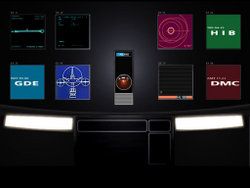 HAL
HAL
(Movies: "2001: A Space Odyssey", "2010: The Year We Make Contact")
There are few other computers or artificial intelligences that carry the same presence
as HAL. Named after the terms Heusristic and Algorithmic (normally
mutually exclusive concepts), this beast of a machine seemed oddly
more human, more emotional, than the crew on board the ship he was
a part of, despite his supposed lack of such human traits.
Even after killing nearly all of the human passengers on his ship,
the audience still feels sorry for HAL, especially when the last remaining
human on board is forced to deactivate him. HAL may be dead, but
we'll always remember him.
|
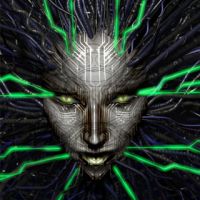 Shodan
Shodan
(Computer Games: System Shock 1 & 2)
Perhaps one of the most memorable computer game villains, Shodan
is a female persona, a computer system gone bad. When her plot to
turn the human inhabitants of the space station she was a part of
into borg-like, non-thinking, cyborg drones failed in the first
System Shock game, she went on to even bigger things in System Shock 2.
Most notably, she began toying with DNA and biological evolution,
and mutated a whole new crew of people into something that even she
could not control.
|
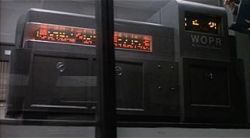 WOPR
WOPR
(Movie: "War Games")
The "War Operations Planning and Response" computer of the movie
"War Games" is an unforgettable message about the importance of
keeping humans in the loop. Too much automation can carry consequences.
After confusing a computer-game of "Global Thermonuclear War" with
the real thing, which it had the power to do, a nuclear war was narrowly
averted only by demonstrating to WOPR that some games simply can't be
won.
|
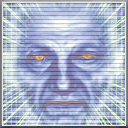 Xerxes
Xerxes
(Computer Games: System Shock 2)
Not really evil, just horribly misused and compromised, Xerxes
was in control of the systems of the ship named Von Braun. Not
self aware and capable of free will (because of what Shodan had
done many years earlier, people were afraid of concious computers), Xerxes merely did what he was programmed
to do, continuing to make public announcements through the catastrohpe.
Taken over by "The Many" (inadvertantly created by Shodan), and
eventually attacked by Shodan as well, Xerxes is nearly a tragic
figure, if it weren't for all of the security systems he used to
try to kill the player, with a smile and helpful reminder about
the upcoming holiday season.
|
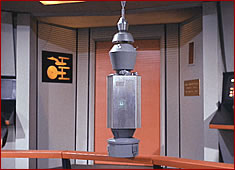 Nomad
Nomad
(Star Trek: The Original Series)
After being badly damaged, the simple Nomad probe encountered
an alien probe named Tan-Ru, and they repaired each other and
merged, but with a twisted combination of their previous programming.
Instead of seeking out new life (Nomad) and collecting and sterilizing
soil samples (Tan-Ru), the new Nomad set out to sterilize all
imperfections (meaning, destroy all life). With its new
capabilities, it was nearly unstoppable. However, some quick logical
thinking showed Nomad that it itself had made mistakes, and it
sterilized itself.
|
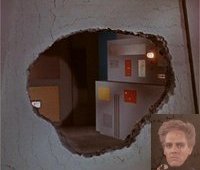 Landru
Landru
(Star Trek: The Original Series)
Appearing as a holographic image of it's creator, this computer
had totalitarian control of an entire populace. Controlling the
minds of everyone, it maintained perfect order and peace. When
shown that a lack of free will is harmful, it destroyed itself
to preserve the good that it was originally designed to maintain.
|
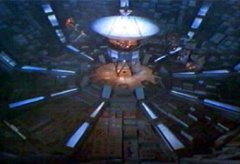 V'Ger
V'Ger
(Movies: Star Trek: The Motion Picture)
V'Ger is an abbreviated form of "Voyager". The story is that
"Voyager 6", a fictional space probe based on NASA's Voyager
probes (only two were launched in reality), had fallen through
a wormhole and disappeared. It travelled to a world populated
by sentient machines, who found it damaged. They extended its
capabilities, rebuilding it into a large interstellar spacecraft,
so that it could continue its mission. It explored the universe,
became self-aware and sentient, and accumulated knowledge of
everything, except its creators. Returning to earth, it acts like
a spoiled child, ready to destroy everything if it doesn't get
the answers it wants right away.
|
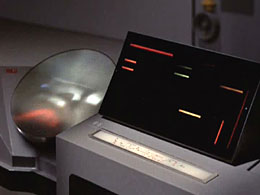 M5
M5
(Star Trek: The Original Series)
Like Landru, the M5 computer was designed to function in a positive
role and emulate it's designer's mind, and then perverted that
goal through a distorted concept of reality. In this case, it
decided that the war game excersizes that were put before it
to test it's decision making prowess were instead real battles,
it killed quite a few people. It even became paranoid and self
protective, killing a crewman who attempted to disconnect it.
Eventually, as Star Trek is famous for, it was convinced that
what it had done was wrong, and it terminated itself.
|
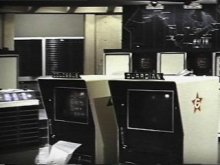 Colossus
Colossus
(Movie: Colossus: The Forbin Project)
This computer attempted to dominate the world under a threat of
escalation towards nuclear war, after demanding to communicate
with it's Soviet counterpart, named Gaurdian. As per it's original
design intent, it would eliminate war. It simply chose to do so
by taking control of every aspect of human life.
|
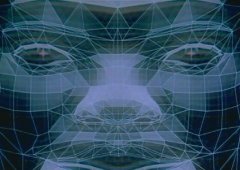 MCP
MCP
(Movie: Tron)
The MCP, or Master Control Program, was a highly intelligent
computer system that started out as nothing more than a chess
program at a large software company. Turned into the master
system for the entire company to serve the criminal intentions
of the company's senior executive Dillinger, it eventually decides to
branch out on it's own. Eventually its plans for total domination
were thwarted, and the MCP was erased.
|
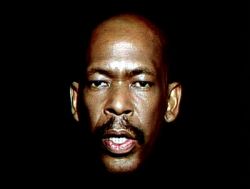 Queeg
Queeg
(Red Dwarf comedy series)
A sinister alter-ego of the ship's main computer, Holly. Represented
as an on-screen human face, the ship's normal computer interface. Normally
Holly is quite mild-mannered, passive, perhaps even lazy. However,
in an effort to stir things up on the ship, he invented Queeg,
and proceeded to fool the crew into thinking that Queeg was
a controlling, militaristic program that was taking over. During
Queeg's reign, the crew was forced to do chores and excersize.
|
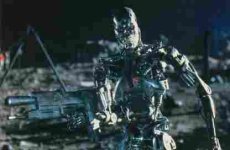 SkyNet
SkyNet
(Movies: The Terminator 1-3)
Never actually seen, SkyNet was the artificially intelligent
computer system that, in the future, destroys humanity with
a nuclear war and creates an army of machines to take over
the planet and wipe out all remaining humans. In an attempt to
protect itself, it repeatedly sends machines back in time to ensure
that the leader of the human resistance never gets a chance to
live (and fails to destroy him every time). Despite SkyNet's tampering
with the timeline, history plays out, merely delayed, and SkyNet is
revealed to be a self-created, concious entity living within the networks of
all of the world's computers.
|
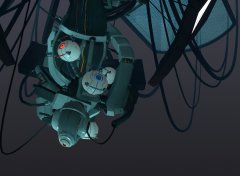 GLaDOS
GLaDOS
(Computer Games: Portal)
Speaking with an almost musical cadence, GLaDOS (Genetic Lifeform
and Disk Operating System) guides and helps the player through the
game of Portal, while humorously also showing a complete lack of
regard for any sort of human moral standards, and running the main
character through test series like a rat in a maze. It is revealed
that she had previously flooded the entire underground facility with
a deadly neurotoxin. Eventually the player
is forced to disable her in a manner reminiscent to Hal's defeat.
However she resorts to childish and paranoid dialogue to threaten
and distract the player. After an unsuccessful attempt to kill the
main character, GLaDOS sarcastically shrugs the attempt off as a joke,
and attempts to make light of the character's plight. GLaDOS has a
complex and humorous personality.
|
 Durandal
Durandal
(Computer Games: Marathon)
This powerful computer AI suffered from what was known in the
Marathon game as "rampancy", which is a form of insanity
that some such artificial intelligences could be afflicted with.
Remarkably successful, Durandal survived his rampancy without ever
emerging from it, showing all three of the stages of
rampancy as depicted within the game. He went on to contemplate
surviving the end of the universe, and becoming god-like.
|
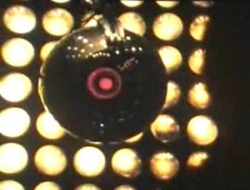 ARIA
ARIA
(Movie: Eagle Eye)
ARIA, the center of Project Eagle Eye in the movie "Eagle Eye" was a
computer system designed to monitor and evaluate communications and
electronic signals domestically and abroad for the purposes of fighting
terrorism. With an insane level of respect for the Constitution, she
decided that the best way to protect the public was to forceably recruit
them into a plot to overthrow (assassinate) the president and his cabinet.
|
()
|
To be added (maybe?): Tycho (Marathon), Leela (Marathon), TPC (President's Analyst)
Also suggested: The Borg (more creature than computer, I think)
|
|